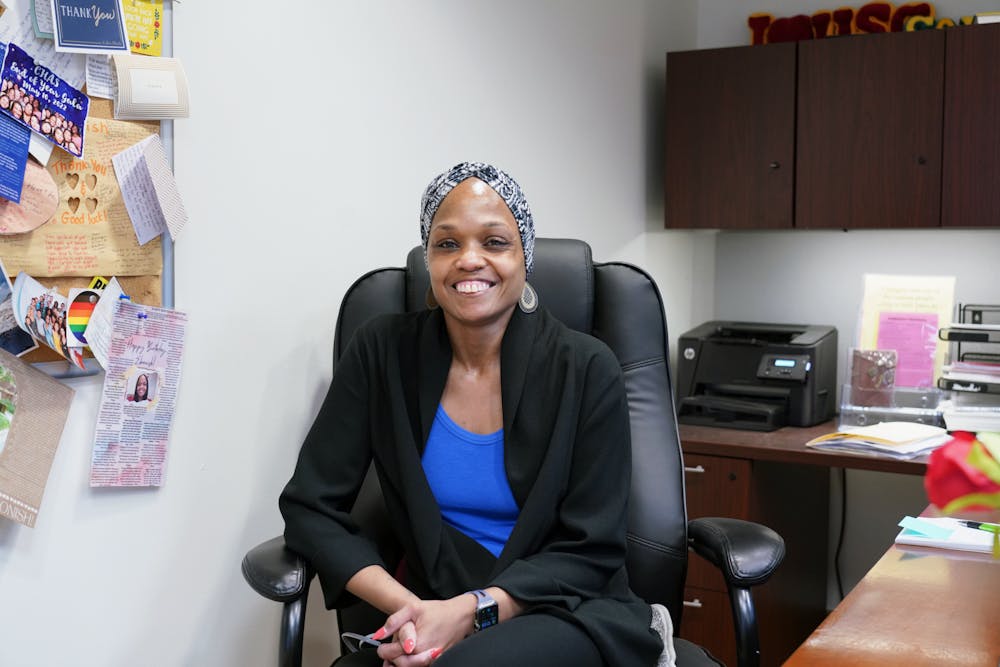First years opening their inboxes every morning confront a dizzying array of stressful emails. Between the Canvas assignments, club reminders, and internship applications, one subject line provides a consistent beacon of light: free food.
“Donuts available now in Craig 107!”
“Pizza for last study break of semester!”
Since the start of the year, Ebonish Lamar—house director of Fisher Hassenfeld—has made sure that first years living in her portion of the Quad know they’re welcome to grab snacks and breakfast without having to leave their dorm. The messages are accompanied by an invitation to stop by her office on the first floor of Class of 1887 and say hello.
While the spread of bagels, muffins, and juice is always impressive, it barely scratches the surface of Lamar’s many responsibilities. Lamar oversees the operations of Fisher, a job that includes supervising the team of resident advisors, managing policies and procedures, working with in–house faculty, and creating a programming structure that helps first years thrive. She keeps her door open for any students who have concerns and questions, as well as those who simply want to chat about their lives with her.
On any given day, Lamar may organize a fun off–campus trip for her residents, speak to a resident advisor about a rooming problem, or meet with a student experiencing a mental health crisis. “No day is the same,” Lamar says. While she finds a thrill in the unpredictability of her job, it can also be a challenge. “There’s not a handbook about it … for what happens when someone comes to your office and they’re bursting out in tears,” she says.
Lamar has over a decade of experience navigating the ups and downs of student affairs. After graduating with a master’s degree in education, she knew she wanted to seek out opportunities outside of her home state of California. She worked in universities in Texas, Vermont, and New York, and she even spent three months on a ship as resident director of a semester at sea program.
When Lamar transitioned to Penn in 2017, the responsibility of directing a college house at Penn seemed to offer a unique opportunity to make an impact on student populations. Lamar moved into an apartment in Fisher, a very short walk away from her office. Her adjustment to Quad living mirrored the experience of the people she takes care of; like many of her residents, she was relocating to an unfamiliar city far away from her family. “I’m a firm believer that you can make your home anywhere,” she says.
To make her first years feel at home, Lamar has led the formation of several affinity spaces in Fisher, providing opportunities for students who are similar in one way or another to build community. These spaces include identity groups for first–generation students, LGBTQ students, and students with English as a second language. “I wanted Fisher to be a place where you didn’t always have to leave the house to seek the support that you needed,” Lamar says.
That goal became infinitely more difficult during the COVID–19 pandemic. As universities across the country began sending students home, Penn instructed all students to move out by March 15, 2020, and to not return for the rest of the semester. Lamar found it difficult to tell her residents goodbye.
“How do you say that nicely? You don’t,” Lamar said. “There’s no nice way to tell people, ‘You can’t live here.’” Fisher, which normally houses over 400 first years, became empty save for Lamar and a couple faculty members. She recalls how isolating it was watching the Quad transform from a bustling living space to a desolate building. Even when some students returned to campus for the following academic year, they stayed in single rooms rather than doubles or triples and participated in college house events on Zoom. Lamar, along with her RA team, led the process of adapting Fisher to serve an entirely virtual community.
“We were all learning on the fly,” Lamar says. “We were all trying to figure out what engagement looked like.” The pandemic required Lamar to balance two simultaneous priorities: engagement and safety. She constantly assessed how she could make students feel supported and connected with one another while still abiding by COVID–19 restrictions. “How do you create a thriving, fun experience that is safe?” she says. “I think that was one of the most critical times of my career.”
With the aftermath of the pandemic came the return of shared spaces as raucous hubs of activity. Yet the challenges Lamar confronted over the past few years have led to a renewed understanding of the importance of health and wellness, an awareness she now brings to every interaction.
“I put the human first, taking care of mind, body, and soul first,” she says. Lamar wants her team and students to feel comfortable stepping back temporarily from activities for the sake of their mental, emotional, physical, and spiritual health. She believes that we should take pride in those “selfish moments” that allow us to bring our best self to the next day. “We can’t show up as team members, as students, if we’re not taking care of ourselves first,” she says.
Lamar lights up when she talks about showing up for her team and engaging with students. Her love for what she does is apparent, but she admits that as a child, the thought of becoming a college house director never crossed her mind. Compared to being a doctor, teacher, or engineer, it’s not a widely known occupation.
And yet, she says, “I think it’s those careers that we don’t talk about that are some of the most rewarding.”

